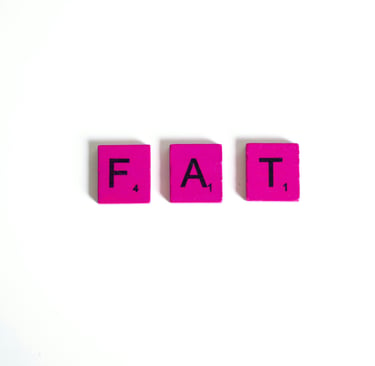This year, we want to achieve more! Donate to support our organization's work HERE.

Call me fat*!
EDUCATIONAL
Ieva Miltina
3/22/20244 min read
*In our communication, we use the word "fat" as a neutral descriptive term without the intention of shaming, offending, or otherwise being discriminatory against bodies of different sizes. By normalizing this word, we take away the power from those who use it to hurt others.
Seemingly since the beginning of time, people have used the word "fat" as a weapon to hurt, belittle, and shame others. A fat person is seen as lazy, sick, and lacking in self-control. They are perceived as not taking care of themselves and are blamed for all the troubles that happen to them. Yet, in recent decades, an increasing number of activists and scientific studies point to the fact that such thinking and related actions negatively affect both the mental and physical health and well-being of individuals with non-normative bodies and society at large. What if we used the word "fat" as a neutral descriptive term? Why and how should we do it in our everyday lives? In this article, we provide the first glimpse into the rhetoric of fatness and potential scenarios for its destigmatization, with the hope of promoting an inclusive and body-positive world.
It is evident that beauty standards and trends change with societal events. In certain times and cultures, fatness was/is associated with fertility, wealth, and health. However, over the last few centuries, it has gradually become a stigmatized trait in the Western world's perception, associated with unhealthy "lower class" individuals and their character as well as the perceived value. While it's challenging to pinpoint centuries of beliefs to a single event, one perspective on the existing demonization of fatness traces back to the Age of Enlightenment in Europe and North America. With the onset of the slave trade, notions of self-control as a crucial indicator of social class emerged, and negative stereotypes about people of other races (considered lazy, barbaric, inhuman, etc.) were also attributed to their characteristic plumpness and differing body shapes (1). Over time, this concept became widely accepted, further reinforced by capitalism, diet culture, and other features of modern times (2).
Step by step, modern society has come to perceive slimness as the standard of beauty and health. The word "fat" has become synonymous with laziness, shame, and an endless fear that even the most beautiful bodies in society's eyes can fall victim to (3). It is often used derogatorily to insult, humiliate, and discriminate against individuals with larger bodies or those who do not conform to these imaginary ideals of appearance. Given this prevailing attitude, it's understandable why fear of gaining weight is one of the biggest fears affecting people of all backgrounds and ages (4).
While much of the latest research on this topic remains yet unfamiliar to many, in recent decades, more and more scientists have emphasized the harmful effects of shaming and discriminating against fat and other non-normative bodies, linking life in oppressed systems directly to mental health issues (depression, anxiety, suicidal thoughts, etc.), eating disorders, and increased mortality (5).


Language and the messages conveyed play a significant role in projecting these prejudices onto people, perpetuating and reinforcing stereotypes that are neither inclusive nor truthful. Language can be used as a tool for body shaming, contributing to the exclusion of individuals based on their appearance. Regular exposure to hurtful phrases and derogatory expressions creates an unfavorable environment and self-image, leading to deep psychological and emotional consequences.
Yet, language can also be a powerful tool to challenge oppressive systems. Notably, in many parts of the world, oppressed groups have utilized language as a significant part of their activism. Therefore, in our work and in this article, we also want to encourage reducing the negative rhetoric surrounding fatness, starting with normalizing the word "fat." This approach is inspired from the fat activism or fat acceptance movement, which began in the 1960s in the USA. They also started by using the term "fat" as a neutral descriptive term to protest against existing bias (6). The preceding paragraphs have outlined why changing the connotation of the word "fat" is necessary, and based on theories about systems of oppression, we advocate for its neutral and respectful use.
Although the common language and its evoked associations cannot be changed instantly, we believe that gradually normalizing the neutral usage of this word and employing it without offensive intent (similar to other adjectives like "short," "tall," "flexible," etc.) is an essential step toward accepting diverse bodies. By purposefully using it in everyday conversations and neutral contexts, we can reduce the stigma surrounding body weight and support those who face body shaming and discrimination regularly. Together with other crucial actions, we wish to pave the way for a more comprehensive understanding of body diversity and inclusion.
- - - - - - - - - - - -
REFERENCES:
Moerschel, L. (2021). The Intersectionality of Anti-fat Prejudice.
Wilson, J. S. (2021). Publicly Fat: Narratives of Fatphobia, Diet Culture, and Intersectional Feminism.
In January 2024, we conducted a study on people with life experience in a larger body. Out of 45 answers in Latvia and about 70 more answers in other European countries, every answer to the question What feelings do you get when you hear the word "fat" or "fatness"? expressed something negative - shame, anxiety or stress, anger, ugliness, etc.
Micali, N., Ploubidis, G., De Stavola, B., Simonoff, E., & Treasure, J. (2014). Frequency and patterns of eating disorder symptoms in early adolescence. Journal of Adolescent Health, 54(5), 574-581. The study found that 63% of girls reported that they were afraid of gaining weight or "getting fat", while only 26% of girls reported that they were afraid of getting breast cancer. There are also a number of other studies that highlight a particularly large fear associated with fatness.
Sutin, A. R., Stephan, Y., & Terracciano, A. (2015). Weight discrimination and risk of mortality. Psychological science, 26(11), 1803-1811.
Cooper, C. (2021). Fat activism: A radical social movement. Intellect.
Photos: Clem Onojeghuo and Anna Tarazevich.

Legal name: Flourish NGO
Reg.no.: 40008290413
Email: mail@flourish.ngo
Account no. for donations: LV88HABA0551059940165
AS SWEDBANK, HABALV22
More information here.


© Flourish NGO 2025 / All rights reserved.
The content on this website is copyrighted and may only be used or republished with the consent of the owner.
